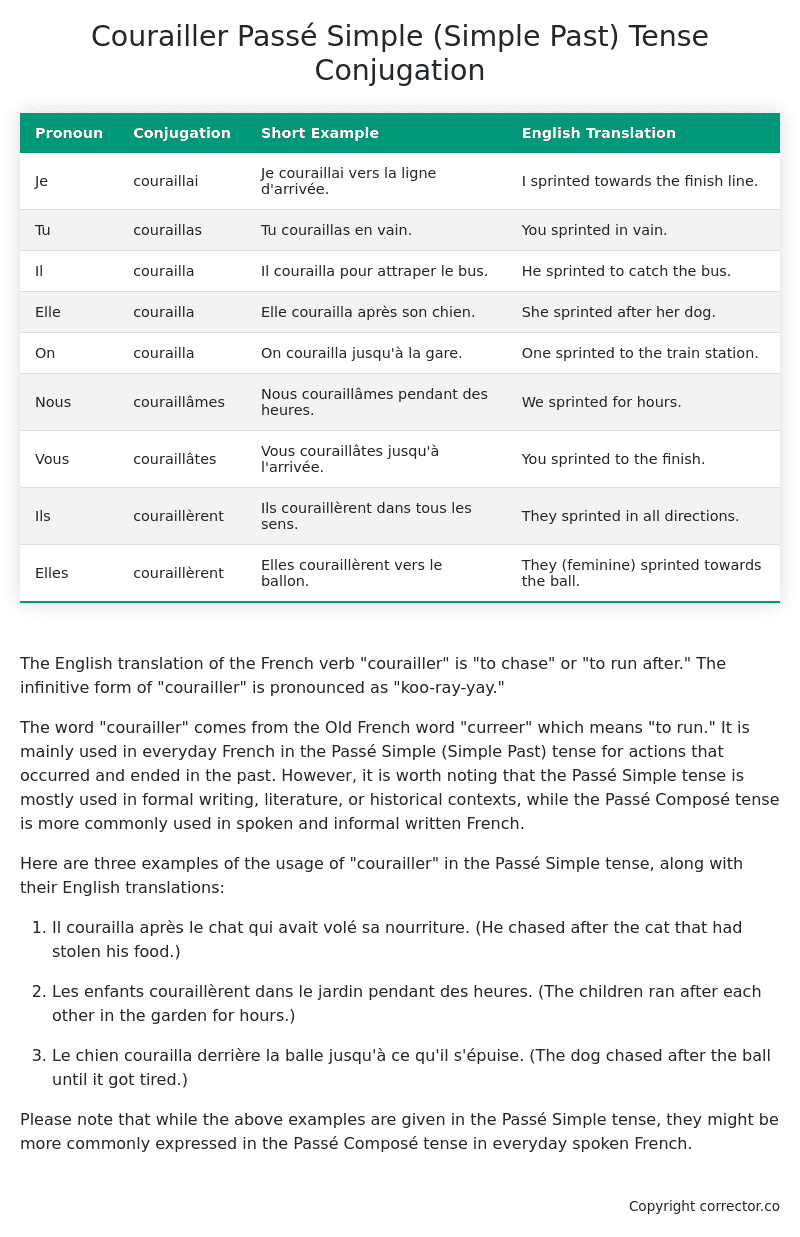Passé Simple (Simple Past) Tense Conjugation of the French Verb courailler
Introduction to the verb courailler
The English translation of the French verb “courailler” is “to chase” or “to run after.” The infinitive form of “courailler” is pronounced as “koo-ray-yay.”
The word “courailler” comes from the Old French word “curreer” which means “to run.” It is mainly used in everyday French in the Passé Simple (Simple Past) tense for actions that occurred and ended in the past. However, it is worth noting that the Passé Simple tense is mostly used in formal writing, literature, or historical contexts, while the Passé Composé tense is more commonly used in spoken and informal written French.
Here are three examples of the usage of “courailler” in the Passé Simple tense, along with their English translations:
-
Il courailla après le chat qui avait volé sa nourriture.
(He chased after the cat that had stolen his food.) -
Les enfants couraillèrent dans le jardin pendant des heures.
(The children ran after each other in the garden for hours.) -
Le chien courailla derrière la balle jusqu’à ce qu’il s’épuise.
(The dog chased after the ball until it got tired.)
Please note that while the above examples are given in the Passé Simple tense, they might be more commonly expressed in the Passé Composé tense in everyday spoken French.
Table of the Passé Simple (Simple Past) Tense Conjugation of courailler
| Pronoun | Conjugation | Short Example | English Translation |
|---|---|---|---|
| Je | couraillai | Je couraillai vers la ligne d’arrivée. | I sprinted towards the finish line. |
| Tu | couraillas | Tu couraillas en vain. | You sprinted in vain. |
| Il | courailla | Il courailla pour attraper le bus. | He sprinted to catch the bus. |
| Elle | courailla | Elle courailla après son chien. | She sprinted after her dog. |
| On | courailla | On courailla jusqu’à la gare. | One sprinted to the train station. |
| Nous | couraillâmes | Nous couraillâmes pendant des heures. | We sprinted for hours. |
| Vous | couraillâtes | Vous couraillâtes jusqu’à l’arrivée. | You sprinted to the finish. |
| Ils | couraillèrent | Ils couraillèrent dans tous les sens. | They sprinted in all directions. |
| Elles | couraillèrent | Elles couraillèrent vers le ballon. | They (feminine) sprinted towards the ball. |
Other Conjugations for Courailler.
Le Present (Present Tense) Conjugation of the French Verb courailler
Imparfait (Imperfect) Tense Conjugation of the French Verb courailler
Passé Simple (Simple Past) Tense Conjugation of the French Verb courailler (You’re reading it right now!)
Passé Composé (Present Perfect) Tense Conjugation of the French Verb courailler
Futur Simple (Simple Future) Tense Conjugation of the French Verb courailler
Futur Proche (Near Future) Tense Conjugation of the French Verb courailler
Plus-que-parfait (Pluperfect) Tense Conjugation of the French Verb courailler
Passé Antérieur (Past Anterior) Tense Conjugation of the French Verb courailler
Futur Antérieur (Future Anterior) Tense Conjugation of the French Verb courailler
Subjonctif Présent (Subjunctive Present) Tense Conjugation of the French Verb courailler
Subjonctif Passé (Subjunctive Past) Tense Conjugation of the French Verb courailler
Subjonctif Imparfait (Subjunctive Imperfect) Tense Conjugation of the French Verb courailler
Subjonctif Plus-que-parfait (Subjunctive Pluperfect) Tense Conjugation of the French Verb courailler
Conditionnel Présent (Conditional Present) Tense Conjugation of the French Verb courailler
Conditionnel Passé (Conditional Past) Tense Conjugation of the French Verb courailler
Conditionnel Passé II (Conditional Past II) Tense Conjugation of the French Verb courailler
L’impératif Présent (Imperative Present) Tense Conjugation of the French Verb courailler
L’impératif Passé (Imperative Past) Tense Conjugation of the French Verb courailler
L’infinitif Présent (Infinitive Present) Tense Conjugation of the French Verb courailler
L’infinitif Passé (Infinitive Past) Tense Conjugation of the French Verb courailler
Le Participe Présent (Present Participle) Tense Conjugation of the French Verb courailler
Le Participe Passé (Past Participle) Tense Conjugation of the French Verb courailler
Struggling with French verbs or the language in general? Why not use our free French Grammar Checker – no registration required!
Get a FREE Download Study Sheet of this Conjugation 🔥
Simply right click the image below, click “save image” and get your free reference for the courailler Passé Simple tense conjugation!

Courailler – About the French Passé Simple (Simple Past) Tense
Formation
Usage
Narration
Historical Context
Interactions with other tenses
Passé Composé
Imparfait
Conditional and Subjunctive
Summary
I hope you enjoyed this article on the verb courailler. Still in a learning mood? Check out another TOTALLY random French verb conjugation!


